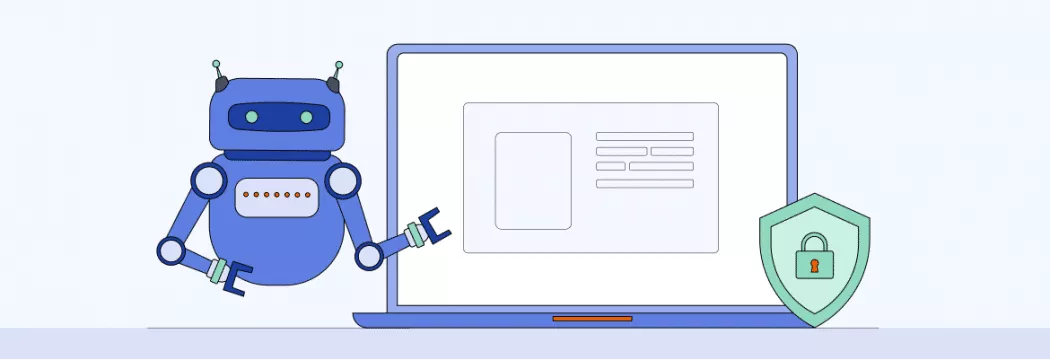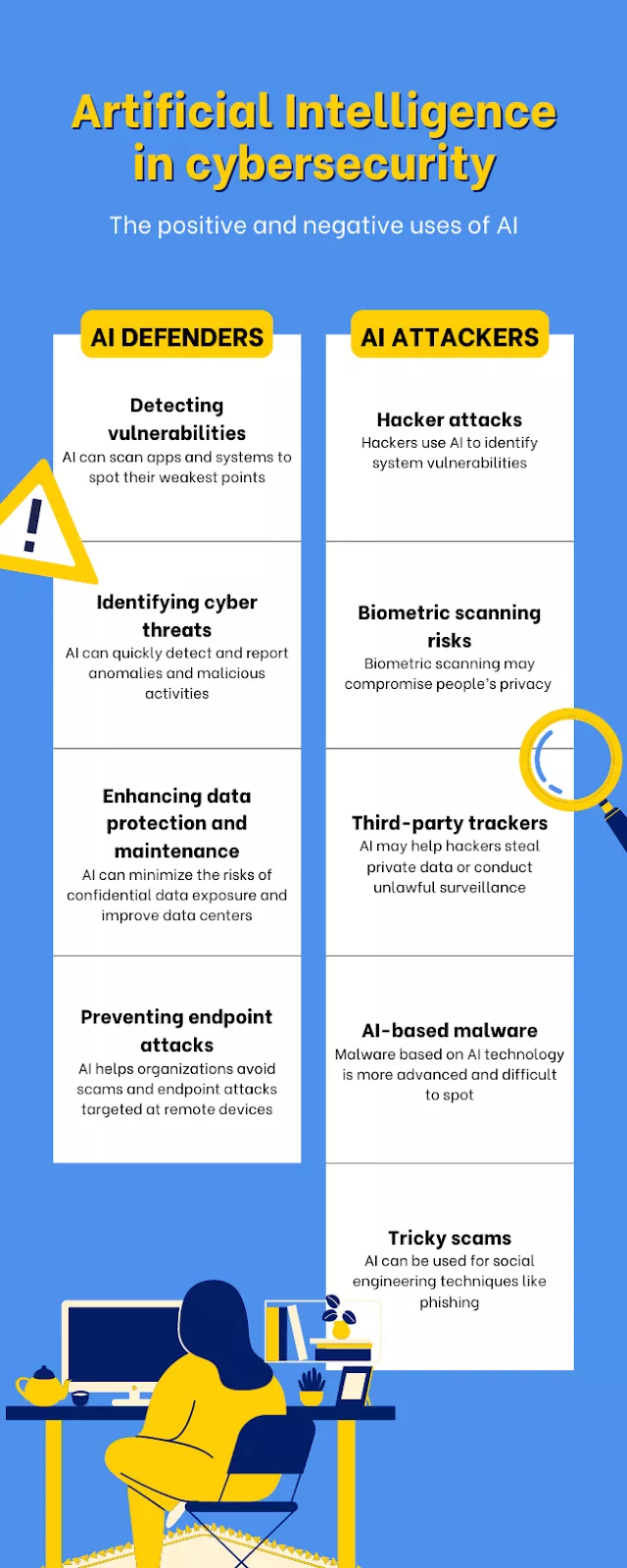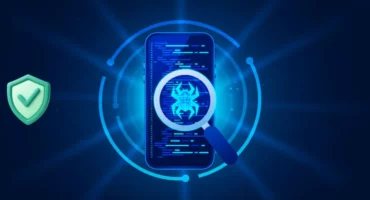Artificial Intelligence in Cybersecurity: A Battle Between AI Attackers and AI Defenders

Cyber threats are everywhere today, and it may seem there’s no way to escape them. Malware, ransomware, phishing, data breaches… And those are just the tip of the iceberg. Furthermore, hackers are using more and more advanced techniques to pass security measures, so traditional approaches do not always manage to detect and stop cyberattacks.
Fortunately, there’s a light at the end of the tunnel. Artificial Intelligence (AI) gives a lot of hope for improving cybersecurity and protecting data from various potential risks. But how exactly does AI in cybersecurity work? And could it have the opposite effect, becoming a tool for malicious activities? Keep reading this article to find out.
What is artificial intelligence?
Before diving deeper into AI security solutions, let’s cover the essentials, defining what artificial intelligence is and how it affects the modern world.
Artificial intelligence (AI) is an innovative technology simulating human intelligence by computers or machines programmed to do tasks traditionally associated with human efforts. If you think that artificial intelligence is something from Asimov’s novels or Cameron’s movies, this is no longer the case. AI solutions are becoming an integral part of many spheres, and you have definitely heard (or even used) some of it.
The most common real-life examples of AI are digital assistants, like Apple’s Siri, financial robo-advisor technologies, self-driving cars, virtual assistants in hospitals, and many more. In fact, AI solutions are almost everywhere, including financial trading, healthcare, marketing personalization, manufacturing, data security, and so on.
Unsurprisingly, the growth of AI technologies shows no sign of stagnation. According to a Fortune forecast, the artificial intelligence market is expected to reach nearly $1.400 billion by 2025, with an impressive 20% CAGR.
How is AI used in cybersecurity?
As AI can process large amounts of data, automatically detect errors, and identify system vulnerabilities, it’s becoming essential for cybersecurity professionals to adopt and integrate AI tools into their workflows. By enhancing the ability to predict and counter threats in real time, AI is not only improving detection rates but also reducing response times. This growing reliance on AI helps professionals manage the increasing complexity of cyber threats, ensuring systems are more secure and resilient against evolving digital attacks.
However, it doesn’t mean that AI cybersecurity can completely replace human effort. Cybersecurity is quite a complex and sensitive field requiring close supervision and expert maintenance. That is why it’s worth having the best of both worlds and combining artificial and human intelligence to prevent any potential threats, from viruses and scams to phishing and keylogging techniques.
Besides, certain downsides also occur. Some hackers even apply AI-based malware to make their attacks more advanced and difficult to handle. So when talking about online security, is AI for better or for worse? To clear things up, let’s talk about the use cases and potential risks of cybersecurity in artificial intelligence in more detail.

AI defenders: How artificial intelligence enhances cybersecurity
When it comes to cybersecurity, there are numerous ways of adopting artificial intelligence. Let’s take a closer look at the most common AI in cybersecurity examples.
Detecting vulnerabilities
According to a recent Edgescan report, almost 5% of web application vulnerabilities are considered a high or critical risk. That is why many organizations struggle to find result-driven solutions to spot and address those weaknesses. And that’s where artificial intelligence comes to the rescue. AI helps test web apps and databases for any inaccuracies or anomalies to eliminate problems before they snowball into a disaster.
Identifying cyber threats
New cyber threats appear lightning fast, from ransomware to social engineering techniques, and people need to learn how to deal with them just as quickly. AI-based tools allow for enhanced scanning of the entire system or database, so it’s much easier to spot any malicious activities, even the ones you’ve never faced.
Enhancing data protection and maintenance
It can be quite challenging to monitor, maintain, and protect large amounts of data, especially for big organizations and businesses. However, this burden can be reduced with AI cybersecurity systems. There are multiple things artificial intelligence can do in this regard, from improving a data center’s infrastructure to minimizing the risks of confidential data exposure.
Preventing endpoint attacks
Every single piece of hardware, from a desktop in an office to a smartphone or tablet, is a potential target for hackers. As a result, an organization’s confidential information can be compromised through hundreds of employees’ personal devices connected to various WiFis (often including public hotspots). That’s why high-level endpoint security is essential. AI-based techniques allow companies to spot unusual or suspicious behavior of remote devices by recognizing malicious patterns and detecting social engineering threats.
AI attackers: How artificial intelligence compromises cybersecurity
There are dozens of benefits AI cybersecurity solutions can bring to both individuals and organizations, no doubts. But in the wrong hands, artificial intelligence will have an opposite effect. Let’s look at the most significant threats to watch out for.
Hacker attacks
Unfortunately, hackers can also adopt AI techniques, while their intentions are far from good. Artificial intelligence makes cyber attacks more sophisticated and difficult to spot. Moreover, malicious actors can use AI to identify system vulnerabilities, using a so-called neural fuzzing technique, and later adopt this information to steal data or spread viruses.
Biometric scanning risks
Biometric information scanning and other AI-based identification techniques are not only a stunning technological advance, but also a potential threat to your online privacy. The thing is that such techniques can collect and store a ton of sensitive information about people, which may later be sold to third parties or even worse.
Third-party trackers
Since AI technology allows for processing large amounts of data, it sadly has a vast potential for stealing and collecting sensitive information. Moreover, hackers can use advanced techniques to conduct unlawful surveillance activities and spy on users’ devices.
AI-based malware
Malicious code and viruses developed on the basis of artificial intelligence pose a severe threat to cybersecurity. Such advanced malware can be untraceable for antivirus software and slip through powerful security systems.
Tricky scams
You don’t have to go to the dark web to fall victim to an insidious scam. In fact, social engineering techniques, such as phishing and smishing, are the most widespread cause of sensitive data exposure. What does it have to do with AI? Well, malicious actors can use artificial intelligence to perform bot attacks or manipulate users by producing fake or offensive content.
Virtual Private Network: an extra cybersecurity layer
Unfortunately, positive and negative influences of artificial intelligence on cybersecurity are both developing rapidly. So despite many innovative AI-based techniques changing our perception of online security, one should not neglect the potential threats this technology may pose. That is why it’s worth empowering your digital security toolkit with some extra tools to protect your privacy and avoid malicious attacks. And a virtual private network (VPN) tops this list.
A VPN is a service that runs your traffic through a remote server and encrypts your data to help you stay anonymous when surfing the web. This tool hides your identity and makes your IP address invisible to the prying eyes. With a VPN, you can avoid third-party trackers, malicious links, dangerous websites, and many other risks. Moreover, a virtual private network can protect you from man-in-the-middle attacks, DDoS attacks, and remote hacking.
However, a trustworthy VPN service provider is a rare bird. Many apps, especially free ones, may turn out to be fake or even dangerous. If you’re looking for a credible solution with all the necessary security features, try VeePN. This service provides powerful AES-256 encryption that comes with several additional security protocols. Besides, VeePN’s NetGuard will help you stay away from monitoring tools, annoying ads, and various cyber threats, including malware and scams.
FAQs
What is artificial intelligence?
Artificial intelligence (AI) is a technology that simulates human intelligence, empowering machines to perform the tasks that used to be done solely by people. AI can be useful for various industries, including healthcare, financial services, marketing, manufacturing, cybersecurity, and more. With its help, organizations can automate many processes, reduce manual work, and eliminate human error risk.
What are some examples of AI in security?
Artificial intelligence is widely used to strengthen and optimize security systems. For example, AI-based systems can detect application vulnerabilities, monitor software to spot advanced cyber threats, protect databases, and prevent endpoint attacks. Read this article to learn more about artificial intelligence security.
VeePN is freedom
Download VeePN Client for All Platforms
Enjoy a smooth VPN experience anywhere, anytime. No matter the device you have — phone or laptop, tablet or router — VeePN’s next-gen data protection and ultra-fast speeds will cover all of them.
Download for PC Download for Mac IOS and Android App
IOS and Android App
Want secure browsing while reading this?
See the difference for yourself - Try VeePN PRO for 3-days for $1, no risk, no pressure.
Start My $1 TrialThen VeePN PRO 1-year plan







